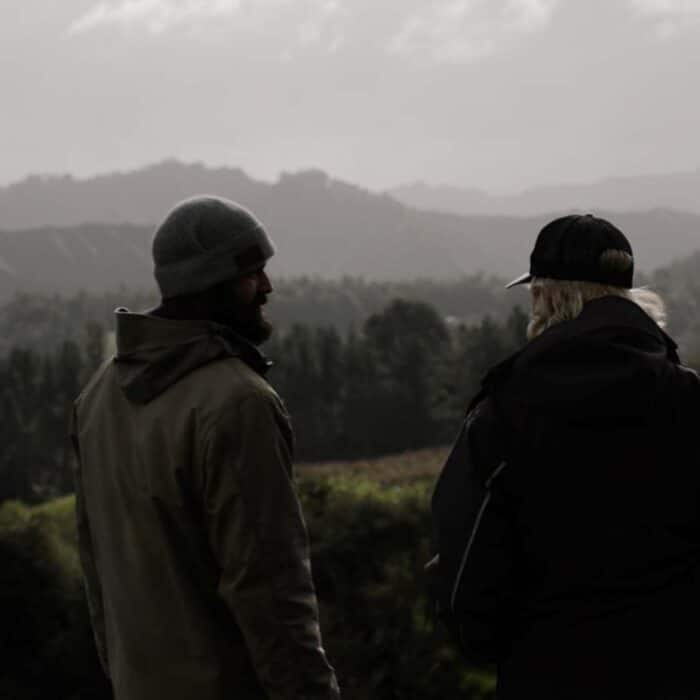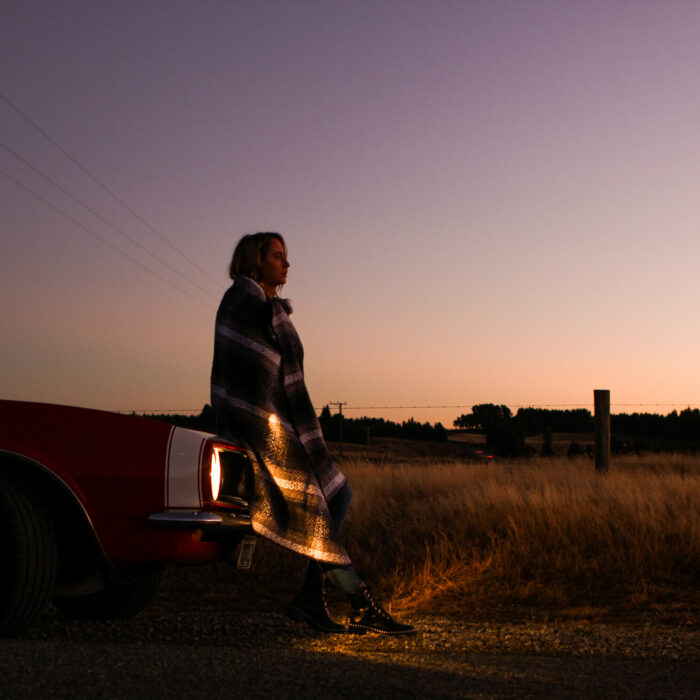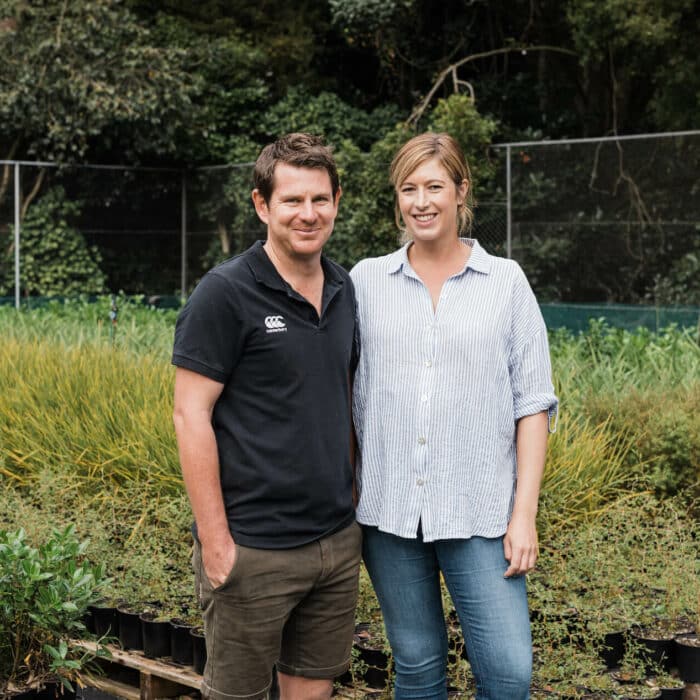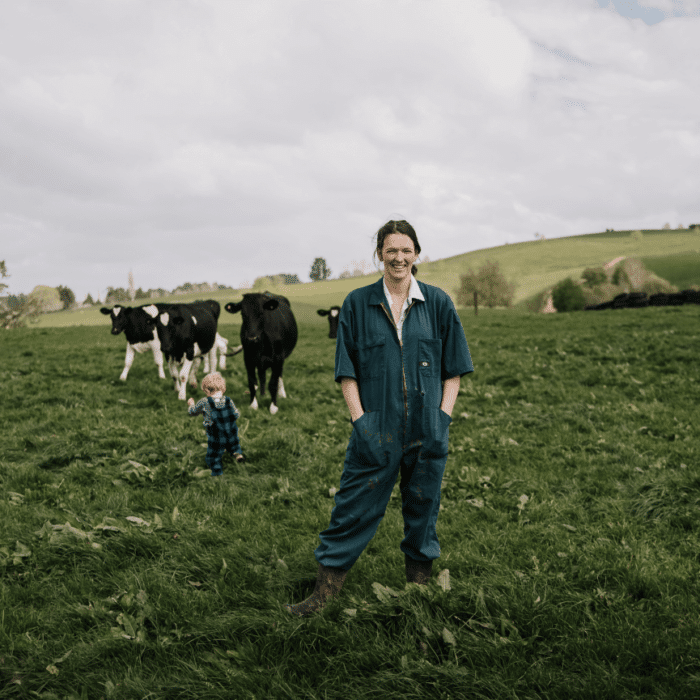10 November 2022
The forest school regenerating native bush and growing inquisitive young minds
Writer: IZZIE THOMPSON
Photographer: Abbe Hoare
For the past thirteen years, Hella Coenen, 67, has been overseeing not only the regeneration of 240 acres of native bush in the Wairarapa but also nurturing local children’s connection with nature.

Situated just outside of Masterton and backing onto the Tararua Forest Park, New Forest is the name that Hella and her partner, Joep de Greeuw, 73, have given their land. Under mature native trees and next to the shallow creek that meanders through the property, Hella runs New Forest School, an interactive, unstructured classroom for children – completely outdoors.
“We named it New Forest because when the canopy trees are coming through the undergrowth we say, ‘Oh, there’s a new forest,’” Hella explains. New Forest School lives up to its name through both the regeneration that Hella and Joep pioneered on their land and the real experiences that the kids come away with. “There’s a relationship between young children and young trees,” says Hella. New Forest School nurtures both.
As a registered Steiner kindergarten teacher with the better part of forty years of experience in education, Hella’s whole life has been about children and nature. “We are losing a whole generation to technology, or sedentary experiences where the head and hands aren’t really involved. They’re bright cookies, but lack exposure to the natural world – the hands-on experiences that used to happen in the shed or the backyard,” Hella says. Witnessing first-hand the effect of nature-deficit disorder on young children’s development stirred Hella to bring New Forest School to life.
Hella and Joep chanced upon the land back when they were newly empty nesters. “As soon as our children left home, we sort of took off,” Hella explains with a smile. “This property came up; the prices were skyrocketing, so for our house in Hawke’s Bay with a little bit of sea view we got these 240 acres. It was marginal land with mature canopy trees so it wasn’t very valuable to farmers.” They took the leap, and straight away retired the land and ninety heads of cattle from grazing. “We just fenced off one horse paddock and that was it.”
Now, just over a decade on, the native regrowth, birds and insect diversity are flourishing. Hella insists that they haven’t done much planting apart from shelter for the birds – it’s all coming back on its own.



“It took quite a while, but now I feel that the forest school is really blossoming because of the regeneration,” Hella says. At the top of their hill – a one and a half-hour round-trip walk that children aged seven and over undertake, with Hella setting a cracking pace up front – everyone is rewarded with a sweeping view of the Tararua Range and Masterton township. Standing on the hilltop, Hella silently surveys the land. “The learning experience is in seeing the overview of the landscape. I don’t say anything about the bare land or the water. The school groups see the line of the mature canopy, the fifty-year-old regrowth, the thirty-year-old regrowth, and our thirteen-year-old regrowth,” says Hella.

Nature offers a real experience, Hella explains. “Children learn through their senses. And nature requires you to use all of your senses. It provides opportunities for creativity, imagination, and space to roam and set challenges. Play can be very complex. The children have to talk to one another – a lot of problem-solving happens. It’s so good for them, all that freedom. One child said to me recently, ‘Nature is awesome. I want to be in nature all day, every day.’”
Early childhood, school and family groups go to New Forest School for a day of learning and free-play in a classroom like no other. Their time is bookended by a waiata and oral storytelling, but is otherwise unstructured. There are swings in the trees, clay and sticks to build huts from or whittle, horses to pet and feed and – of course – all that open space. The kids choose where they’ll go, on the kind of terrain that provides challenges of its own. “There’s risk involved, even when running down a steep hill: every step you have to decide where you’ll put your foot – hopefully not in the blackberry bushes! These kids, they set themselves challenges all the time, because that’s what they need. Risk-taking in nature builds resilience in the elements. Building blocks for life. It’s trust, really.”
Towards the end of the day, everyone helps to cook up a big pot of soup over the fire. The vegetables are brought along by the children and some come from Hella and Joep’s self-sufficient garden. Then, Hella will tell a story. “Traditionally, of course, everything was passed on orally. But now oral storytelling is in decline,” says Hella. “It’s great for the children to see that you can memorise and retell a tale.” Whether she is talking about the different native species surrounding them in the outdoor classroom, or something from another time or universe, the kids’ excitement is palpable.
“Although we have this beautiful land here, people don’t come to it or go tramping so much now. You have to help families and kids over their thresholds and make it accessible and attractive. It can be scary for them,” Hella explains. Once there, immersed in the environment, the connection between the kids and the outdoors comes about naturally. “[The teachers who visit with their students] are in awe because they see the children in such a different light. The distracted ones or those with behavioural disorders really thrive. Statistics show that, too. The teachers are very happy to have their children spend time in a different place because it remotivates them for learning.”
The connection to the land and environment is further cultivated by regular visits. “Groups come back to experience the seasons. A weekly rhythm would be ideal, but it just doesn’t happen with the low population around here,” says Hella. Families come from as far away as Feilding and the Hutt Valley. For many, it involves first encounters. “One child said to me, ‘I’ve never been so close to a horse before. Can I kiss it?’” Hella laughs.
To locals, an outdoor classroom and the Tararuas may seem an unlikely, even unachievable, combination. When asked about the ‘traditional home of rain and fog’ – as tramper Geoff Spearpoint called the range – Hella responds: “A favourite Forest School quote is, ‘There’s no such thing as bad weather, only unsuitable clothing.’”
Glossary. Waiata, song, singing.




This story is part of THREAD, a year-long project by Shepherdess made possible thanks to the Public Interest Journalism Fund through NZ On Air.
If you enjoyed this story, please share with someone else.
Get your hands on a copy of Shepherdess.
Related Stories
Making the Right Country Notes
For the past decade, independent singer-songwriter, Kaylee Bell, has been making a name for herself in the Australian and American country music scenes.
The short course full of “useful little gems” to help identify stress and prioritise wellbeing in yourself and others
Alice Trevelyan, 33, completed the ‘Know Your Mindset. Do What Matters’ programme with her husband, Dave.
Reaching New Heights
The twenty-eight-year-old farmer, vet and mum has made history, becoming the first woman ever to win the FMG Young Farmer of the Year competition in its fifty-five-year history.



